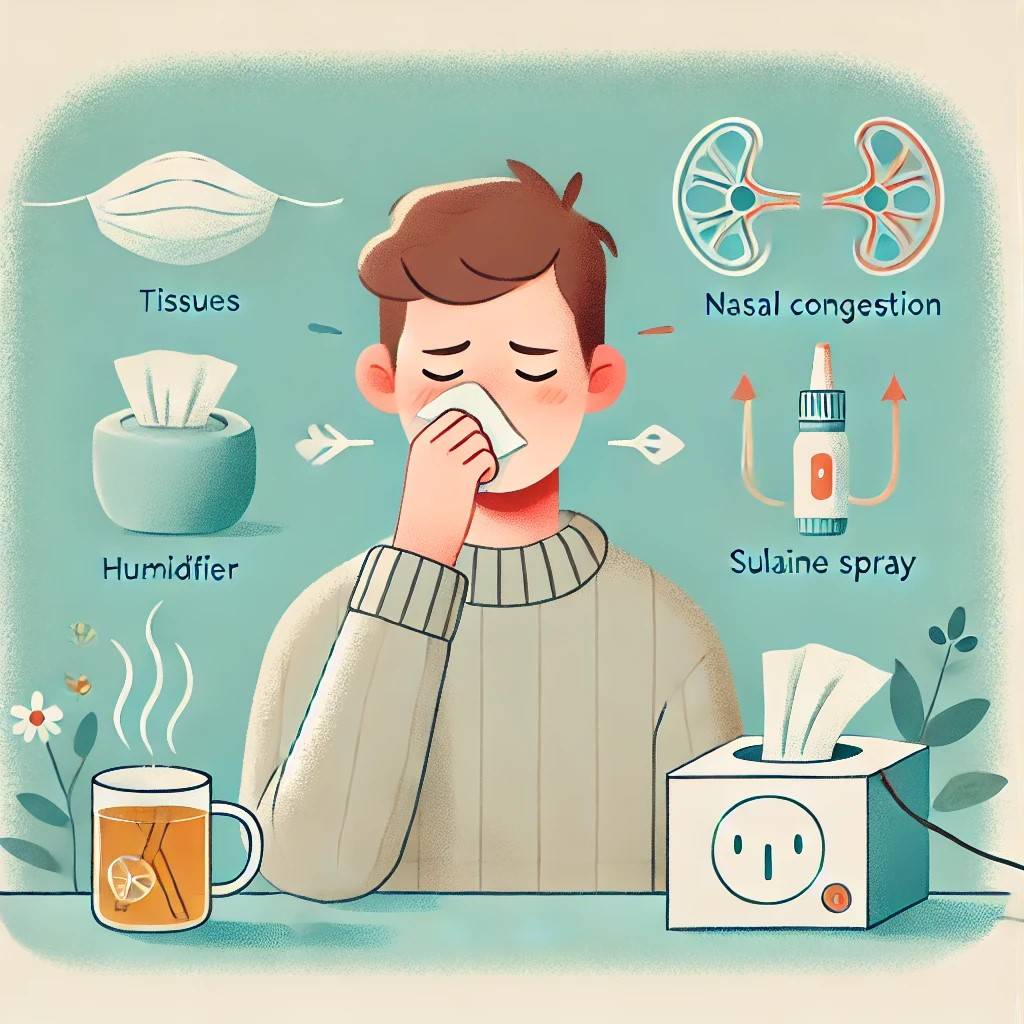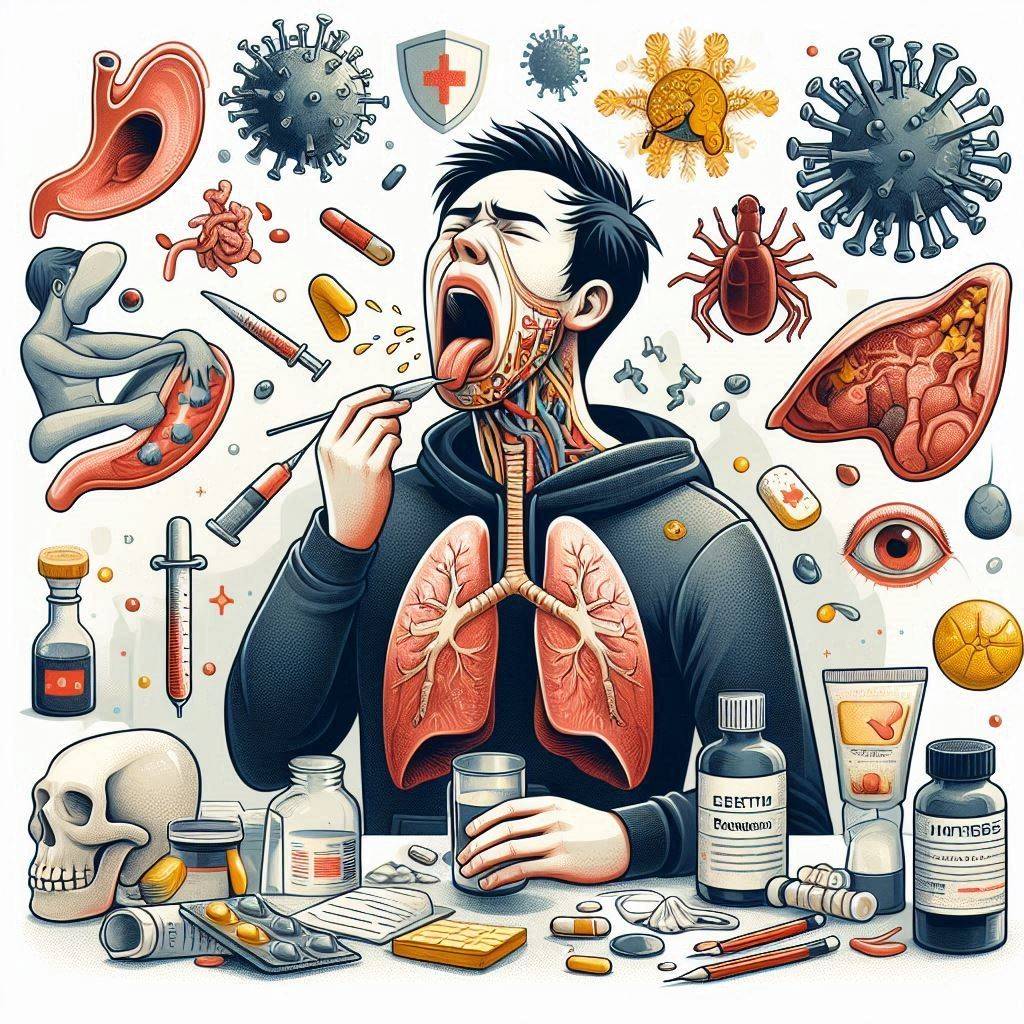Struggling with catarrh? Discover the causes, recognize symptoms, and find quick relief. Learn effective remedies for this pesky condition now.
Have you ever felt like there’s a constant drip at the back of your throat? Or you’re always clearing your throat, feeling like something’s stuck there? If so, you might be dealing with catarrh. I’ve seen many people struggle with this pesky condition, and I’m here to help you understand and manage it better.
What is Catarrh?

It is a fancy word for something simple: it’s when your body makes too much mucus. This extra mucus can build up in your nose, sinuses, or throat. It’s your body’s way of protecting itself, but sometimes it goes a bit overboard.
Symptoms of Catarrh
How do you know if you have Postnasal drip? You might notice these typical symptoms:
- A feeling of mucus dripping down the back of your throat (also called post-nasal drip)
- Needing to clear your throat often
- Feeling like there’s a lump in your throat
- A stuffy or blocked nose
- Headaches or face pain
- Losing your sense of taste or smell
- Trouble sleeping
- Chronic cough, especially at night
I’ve experienced most of these symptoms myself, and let me tell you, they can be annoying!
What Causes Catarrh?
It can happen for many reasons. Let’s explore the primary reasons behind this condition.
1. Infections
Colds, flu, and other respiratory infections can make your body produce more mucus. This is your body’s way of trying to flush out the germs.
2. Allergies
If you’re allergic to things like pollen or dust, your body might react by making more mucus. This is why Nasal discharge often gets worse during allergy season. Allergic rhinitis is a common culprit here.
3. Sinus Problems
Conditions like sinusitis can lead to respiratory mucus. When your sinuses are inflamed, it’s harder for mucus to drain properly.
4. Environmental Factors
Sometimes, the surrounding air can trigger catarrh. Things like smoke, pollution, or even changes in the weather can irritate your nose and throat, leading to more mucus production.
5. Gastroesophageal Reflux Disease (GERD)
Surprisingly, problems with your stomach can cause Rhinorrhea too. If stomach acid backs up into your throat (a condition called GERD), it can irritate your airways and cause more mucus.
How to Get Fast Relief from Catarrh

Now for the part you’ve been waiting for – how to feel better! Here are some effective ways to manage Mucus buildup:
Stay Hydrated
Drinking plenty of water is one of the simplest and most effective ways to thin out mucus. Aim for at least 8 glasses a day. Hot drinks like herbal tea can be especially helpful. I’ve found that ginger tea works wonders for me!
Try Nasal Irrigation
Rinsing your nose with salt water can help flush out excess mucus. You can buy saline sprays at the pharmacy or make your solution at home. Here’s how:
- Heat a pint of water and allow it to cool down.
- Mix in 1 teaspoon of salt and 1 teaspoon of baking soda
- Use this to rinse your nose, letting the water run out into the sink
I’ve tried this method myself, and while it feels a bit weird at first, it helps simple things up!
Inhale Steam
Steam can work wonders for throat mucus. Try taking a hot shower, or do a steam inhalation:
- Pour hot water into a large bowl
- Drape a towel over your head
- Lean over the bowl (not too close!) and breathe in the steam for 5 minutes
This is my go-to method when I’m feeling congested. It feels like giving your sinuses a mini spa day!
Use a Humidifier
Dry air can make the Throat mucus worse. A humidifier adds moisture to the air, which can help thin out mucus and make it easier to clear. I like to use one in my bedroom at night.
Elevate Your Head While Sleeping
Propping up your head with an extra pillow can help mucus drain while you sleep, instead of pooling in your throat. This simple trick has improved my sleep quality.
Try Over-the-Counter Medications
Decongestants, mucus-thinning medications, or antihistamines might help, depending on what causes your catarrh. Always check with a pharmacist or doctor before starting any new medication.
Gargle with Salt Water
This old remedy can help soothe sore throat and loosen mucus. Dissolve half a teaspoon of salt in a warm glass of water and use it to gargle. It’s not the most pleasant taste, but it does help!
Avoid Irritants
Stay away from things that I think will make your throat mucus worse, like cigarette smoke, spicy foods, or alcohol. I’ve noticed a big difference in my symptoms since cutting back on spicy foods.
Eat Anti-Inflammatory Foods
Some foods might help reduce inflammation and mucus production. Try adding more fish, fruits (especially citrus), and vegetables to your diet. I’ve started eating more salmon and leafy greens, and like it’s made a difference.
Essential Oils
Some people find relief using essential oils like eucalyptus or peppermint. You can add a few drops to your humidifier or mix with a carrier oil for a chest rub. Just be sure to do a patch test first to check for any allergic reactions.
Natural Remedies
If you prefer natural solutions, here are some ideas:
Ginger Tea
Ginger reduces inflammation and boosts your immune system. Boil fresh ginger slices in water, add honey, and enjoy! I’ve used ginger tea for years, and it’s one of my go-to remedies for throat irritation.
Turmeric Milk
Turmeric contains curcumin, which fights infections. Mix turmeric powder with warm milk and drink before bed. I’ve tested this remedy, and it’s great for reducing respiratory tract mucus.
Peppermint Oil
Peppermint oil has menthol, which opens your airways. Use it in steam inhalation or apply diluted oil to your chest. I love peppermint oil because it provides instant relief for a blocked nose.
Honey and Lemon
Honey soothes your throat, while lemon provides vitamin C. Mix them in warm water for a refreshing drink. I’ve shared this recipe with friends, and they love it!
When to see a doctor
While catarrh is usually harmless, sometimes it can signal a more serious problem. See a doctor if:
- Your catarrh lasts for several months
- You have a high fever
- You’re having trouble breathing
- There’s blood in your mucus
- The mucus smells bad
Living with Catarrh
Dealing with Throat mucus can be frustrating but remember – it’s usually temporary. With the right care and patience, you can manage your symptoms and feel better. Don’t hesitate to reach out to a healthcare professional if you’re concerned or if your symptoms persist.
Remember, everyone’s body is different. One person’s solution might not be effective for another. It might take some trial and error to find the best way to manage your Mucus buildup. Stay patient and keep persevering!
Preventing Catarrh
Prevention is key to avoiding catarrh. Follow these tips to lower your risk:
- Wash your hands regularly to prevent infections.
- Stay away from smoke and pollution.
- Manage allergies with proper care.
- Exercise regularly to boost your immune system.
- Consume a well-rounded diet packed with fruits and vegetables.
I’ve noticed that people who take these steps tend to experience fewer episodes of Catarrh.
Frequently asked questions
What is catarrh called in the USA?
In the USA, catarrh is often referred to as “postnasal drip.” This term describes the sensation of mucus dripping down the back of the throat, which is a common symptom of catarrh.
How do you treat catarrh?
It can be treated in several ways:
- Staying hydrated to thin mucus
- Using saline nasal rinses
- Inhaling steam or using a humidifier
- Taking over-the-counter decongestants or antihistamines
- Elevating your head while sleeping
- Avoiding irritants like smoke or spicy foods
- In some cases, your doctor might prescribe medications like steroid nasal sprays
What is the difference between mucus, phlegm, and catarrh?
Although these terms are frequently used as synonyms, they have subtle distinctions:
- Mucus is the general term for the slimy, protective fluid produced by mucous membranes throughout the body.
- Phlegm specifically refers to mucus produced in the respiratory tract.
- Catarrh refers to the excessive build-up of mucus in the nose, sinuses, or throat, and the associated symptoms.
Why is mucus flowing down my throat?
This sensation, known as postnasal drip, is a common symptom of catarrh. It happens when excess mucus from your nose or sinuses drips down the back of your throat. This can be caused by various factors, including allergies, infections, or environmental irritants. Your body is constantly producing mucus, but you only notice it when there’s too much or when it’s thicker than usual.
Conclusion
Catarrh might be a pain, but it’s not something you have to just live with. By understanding what causes it and trying out different remedies, you can find relief and breathe easier. Remember, if your symptoms persist or worsen, don’t hesitate to seek medical advice. Here’s to clear airways and easier breathing.



